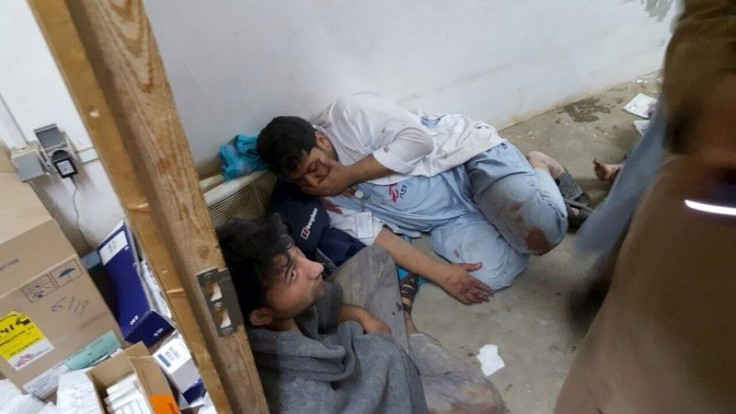Afghan Hospital Airstrike: US Will Compensate Victims Of Deadly Attack, Pentagon Says

The United States will compensate families and victims of the deadly airstrike on a Doctors Without Borders hospital in Kunduz, Afghanistan, the Department of Defense said Saturday, CNN reported. The Oct. 3 airstrike killed 22 people, including 10 patients, three of whom were children, and 12 Doctors Without Borders staff members. All were Afghan.
The amount of the "condolence payments" has not yet been determined, Pentagon spokesman Peter Cook said. The U.S. plans to give the money to "civilian noncombatants injured and the families of civilian noncombatants killed as a result of U.S. military operations," he added. The U.S. military initially described the attack as possible "collateral damage."
U.S. President Barack Obama called the head of Doctors Without Borders, an international medical charity that has won the Nobel Peace Prize, to apologize Wednesday for the airstrike. The U.S. military has described the incident as a mistake, and Gen. John F. Campbell, the top U.S. commander in Afghanistan, said Tuesday the U.S. had not followed proper protocol in calling in the airstrike. Defense Secretary Ash Carter has said the U.S. military acknowledges a mistake it deeply regrets.
"The Department of Defense believes it is important to address the consequences of the tragic incident at the Doctors Without Borders hospital in Kunduz, Afghanistan," Cook said in the Pentagon statement. The U.S. also plans to cover the costs of repair for the hospital.
Doctors Without Borders, also known by its French name, Médecins Sans Frontières, Wednesday demanded an international and independent investigation into the airstrike, which took place in the predawn hours -- from 2:08 to 3:15 a.m. local time -- of Oct. 3. The attack hit, in roughly 15-minute intervals, a hospital building that included an intensive-care unit, emergency rooms and other wards housing more than 100 patients.
Initial reports said Afghan forces called for the air support from the U.S. because they were taking enemy fire from the Taliban. Afghan forces have been embroiled in a battle to retake the northern Afghan city of Kunduz from the Taliban, which overran the city in late September.
Afghan President Ashraf Ghani also announced Saturday that he had opened an investigation into how the Taliban managed to take over the city, as well as the events surrounding the hospital airstrike.
A team of five men were appointed to deliver a "comprehensive report so that we know what happened in Kunduz," the Associated Press quoted Ghani as saying. An investigation is necessary to determine "what happened in the incident, how information was collected and how the incident happened based on that information," a statement attributed to Ghani said, referring to the hospital attack.
According to Doctors Without Borders, the hospital was free of fighters and fighting before the attack. "Our staff reported no armed combatants or fighting in the compound prior to the airstrike," the group said, adding that it had provided both U.S. and Afghan military officials with the hospital's GPS coordinates.
"The facts and circumstances of this attack must be investigated independently and impartially, particularly given the inconsistencies in the U.S. and Afghan accounts of what happened over recent days," Joanne Liu, the group's international president, said Wednesday. "We cannot rely on only internal military investigations by the U.S., NATO and Afghan forces."
© Copyright IBTimes 2024. All rights reserved.












